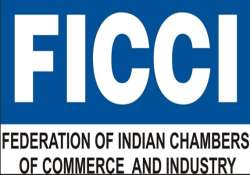India to grow at 5.5% in FY 2015: FICCI
New Delhi: India's economic growth is likely to pick up and reach 5.5 percent in 2014-15 as industrial output will recover to expand at 3.3 percent, says Ficci. The Economic Outlook Survey by the industry chamber

New Delhi: India's economic growth is likely to pick up and reach 5.5 percent in 2014-15 as industrial output will recover to expand at 3.3 percent, says Ficci.
The Economic Outlook Survey by the industry chamber pegs agriculture and services sector growth in the next financial year, starting April 1, at 3.3 percent and 7 percent respectively.
It also estimates that growth in the fourth quarter of the current fiscal will pick up marginally to 5 percent.
“However, this might imply that actual growth in the year 2013-14 will be slightly lower than the growth of 4.9 percent projected by the Central Statistical Organization some time back,” Ficci said.
On inflation, it said that majority of the participating economists felt that going ahead both WPI and retail inflation rates would remain range bound.
Inflation based on Wholesale Price Index (WPI) is expected to stay at about 5.5 percent in 2014-15 and the one based on the Consumer Price Index (CPI) will be at about 7.9 percent, as per the survey.
On CPI becoming the new anchor for the Reserve Bank's monetary policy, the opinion was divided. Some economists felt that it is a good indicator, while others were of the opinion that monetary policy decision on the basis of a single parameter may not be a correct approach.
Moreover, they said that CPI is a fairly new series available only since 2011 and hence does not adequately portray the underlying trends.
Further, the median forecast for fiscal deficit as a percent of GDP stands at 4.4 percent for 2014-15. This is higher than the 4.1 percent estimate announced in the Interim Budget last month. Subsidy burden continues to be a bothering factor and can lead to fiscal slippages, according to the economists polled by Ficci.
On the external sector, the survey pegs current account deficit (CAD) to remain in the comfort zone at 2.2 percent in 2014-15.
Moreover, the rupee value is projected at 61 against the US dollar by March-end 2015.
The participating economists cited high cost of borrowing and delays in government approvals as the key reasons hindering investments.
The Economic Outlook Survey by the industry chamber pegs agriculture and services sector growth in the next financial year, starting April 1, at 3.3 percent and 7 percent respectively.
It also estimates that growth in the fourth quarter of the current fiscal will pick up marginally to 5 percent.
“However, this might imply that actual growth in the year 2013-14 will be slightly lower than the growth of 4.9 percent projected by the Central Statistical Organization some time back,” Ficci said.
On inflation, it said that majority of the participating economists felt that going ahead both WPI and retail inflation rates would remain range bound.
Inflation based on Wholesale Price Index (WPI) is expected to stay at about 5.5 percent in 2014-15 and the one based on the Consumer Price Index (CPI) will be at about 7.9 percent, as per the survey.
On CPI becoming the new anchor for the Reserve Bank's monetary policy, the opinion was divided. Some economists felt that it is a good indicator, while others were of the opinion that monetary policy decision on the basis of a single parameter may not be a correct approach.
Moreover, they said that CPI is a fairly new series available only since 2011 and hence does not adequately portray the underlying trends.
Further, the median forecast for fiscal deficit as a percent of GDP stands at 4.4 percent for 2014-15. This is higher than the 4.1 percent estimate announced in the Interim Budget last month. Subsidy burden continues to be a bothering factor and can lead to fiscal slippages, according to the economists polled by Ficci.
On the external sector, the survey pegs current account deficit (CAD) to remain in the comfort zone at 2.2 percent in 2014-15.
Moreover, the rupee value is projected at 61 against the US dollar by March-end 2015.
The participating economists cited high cost of borrowing and delays in government approvals as the key reasons hindering investments.